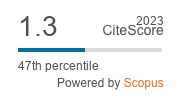Potential and Possible Ways of Harmonizing the Personal Income Taxation Process
DOI:
https://doi.org/10.2478/cer-2018-0022Keywords:
personal income taxation, EU integration, harmonization proces, tax system, public financeAbstract
Personal income tax (hereinafter referred to as PIT) has a short history, as it appeared in tax systems of EU countries as late as at the end of the 18th century. As a specific universal structure it performs two economic functions: providing financial means for covering some public expenses (fiscal function), leveling inequalities – through its structure – in population incomes (a redistribution function). It also implements social functions of taxation through various tax reliefs and exemptions or the structure of the tax scale. Contemporary personal income tax in European countries has been shaped by many years of evolution. This proces is continuing, taking into account the process of European integration and the processes of standardizing and harmonizing tax systems in European Union countries. Most EU states only sporadically implement major reforms of personal income taxation. The scope of such changes is usually limited and determined by current fiscal needs or the need to stimulate a particular behavior of taxpayers. The current taxation of personal incomes is a very complex phenomenon which should be analyzed not only from the legal point of view, but also taking into account its social, cultural, economic and political system aspects.
Downloads
References
Auerbach, A., Hines, J. (2001), Taxation and economic efficiency, ʽNBER Working Paperʼ, No. 8181.
Google Scholar
Cnossen, S. (2001), Tax Policy in the European Union: A review of Issues and Options, ʽStudies in Economic Policyʼ, No. 1.
Google Scholar
Cullen, B., Gordon, R. (2002), Taxes and Entrepreneurial Activity: Theory and Evidence for the U. S., ʽNBER Working Paperʼ, No. 9015.
Google Scholar
Davidson, S. (2007), Tax Competition. Much To Do About Very Little, ʽThe Center For Independent Studies, CIS Policy Monographʼ, No. 78.
Google Scholar
Desai, M., Foley, F., Hinses, J. (2004), Economic Effects of Regional Tax Havens, ʽNBER Working Paperʼ, No. 10806.
Google Scholar
Druesne, G. (1995), Prawo materialne i polityki Wspólnot i Unii Europejskiej, Scholar, Warszawa.
Google Scholar
Gajl, N. (1995), Modele podatkowe. Podatki dochodowe, Wydawnictwo Sejmowe, Warszawa.
Google Scholar
Grądalski, F. (2006), System podatkowy w świetle teorii optymalnego opodatkowania, Oficyna Wydawnicza SGH, Warszawa.
Google Scholar
Gwiazdowski, R. (2007), Podatek progresywny i proporcjonalny. Doktrynalne przesłanki, praktyczne konsekwencje, Uniwersytet Warszawski, Warszawa.
Google Scholar
Hall, R., Rabushka, A. (2005), The flat tax. 2nd edition, Hoover Institution Press & Stanford University, Stanford.
Google Scholar
Hamakers, H., Holmes, K., Głuchowski, J., Kardach, T., Nykiel, W. (2006), Wprowadzenie do międzynarodowego prawa podatkowego. 1 wyd., LexisNexis, Warszawa.
Google Scholar
Heitger, B. (2001), The Scope of Government and Its Impact on Economic Growth in OECD Countries, ʽWorking Paperʼ, No. 1034.
Google Scholar
Henman, P. (2007), Updated Costs of Children Using Australian Budget Standards, Combat Poverty Agency, Queensland.
Google Scholar
Hite, P., Roberts, M. (1992), Analysis of the tax reform based on taxpayers perceptions of fairness and self‑interest. ʽAdvanced in Taxationʼ, Vol. 4, No. 4.
Google Scholar
Holmes, H. (2001), The concept of income: a Multidisciplinary analysis, IBFD, Amsterdam.
Google Scholar
Inventory of Taxes In the Member States of the European Union (2011–2016), European Commission, Luxembourg.
Google Scholar
James, S., Nobes, Ch. (2012), The Economics of Taxation, Fiscal Publications, Birmingham.
Google Scholar
Kesti, J. (2012–2016), European Tax Handbooks 2012–2016, International Bureau of Fiscal Documentation, Amsterdam.
Google Scholar
Koester, R., Kormendi, R. (1989), Taxation, Aggregate Activity and Economic Growth: Cross‑Country Evidence on Some Supply‑Side Hypotheses, ʽEconomic Inquiry: Western Economic Association Internationalʼ, Vol. 27, No. 3.
Google Scholar
Krajewska, A. (2012), Podatki w Unii Europejskiej, PWE, Warszawa.
Google Scholar
Levine, R., Renelt, D. (1992), A Sensitivity Analysis of Cross‑country Growth Regressions, ʽThe American Economic Reviewʼ, No. 82(4).
Google Scholar
Lipmniewicz, R. (2011), Europejskie prawo podatkowe, Difin, Warszawa.
Google Scholar
Litwińczuk, H. (2009), Podatki bezpośrednie. Prawo polskie a prawo wspólnotowe. Implementacja Dyrektyw. Orzecznictwo, Wydawnictwo Wiedza i Praktyka, Warszawa.
Google Scholar
McGee, R. (2004), The Philosophy of Taxation and Public Finance, North‑Western Publishing, Boston‑Dordtech‑London.
Google Scholar
Pecorino, P. (1993), Tax Structure and Growth in a Model with Human Capital, ʽJournal of Public Economicsʼ, No. 52.
Google Scholar
Tanzi, V., Zee, H. (1998), Taxation and the Household Saving Rate: evidence from OECD countries, ʽIMF Working Paperʼ, No. WP/98/36.
Google Scholar
Taxation Trends in The European Union (2012–2016), Publications Office of the European Union Commission, Luxembourg.
Google Scholar
Torres, C., Mellbye, K., Brys, B. (2012), Trends in Personal Income Tax and Employee Social Security Contribution Schedules, ʽWorking Papersʼ, No. 12.
Google Scholar
Wołowiec, T. (2011), Wybrane zagadnienia harmonizacji opodatkowania osób fizycznych, ʽFinansowy Kwartalnik Internetowy: e‑Finanseʼ, Vol. 7, No. 2.
Google Scholar
Wróbel, A., Muedecki, A. (2011), Harmonizacja prawa podatkowego w Unii Europejskiej, Instytut Wydawniczy Europrawo, Warszawa.
Google Scholar
Zee, H. (2005), Personal income tax Reform: Concepts, Issues, and Comparative Country Development, ʽWorking Paperʼ, No. WP/05/87.
Google Scholar
Downloads
Published
How to Cite
Issue
Section
License

This work is licensed under a Creative Commons Attribution-NonCommercial-NoDerivatives 4.0 International License.











